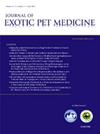口服卡泊瑞林对健康四趾刺猬(Atelerix albiventris)食物摄入量和体重的影响
IF 0.6
4区 农林科学
Q4 VETERINARY SCIENCES
引用次数: 0
摘要
背景虽然食欲不振是患病四趾刺猬(Atelerix albiventris)的常见临床症状,但有关在该物种中使用食欲刺激剂的信息却很有限。卡普瑞林是一种生长激素分泌剂,可作为一种选择性胃泌素受体激动剂发挥作用。方法在一项随机、盲法、安慰剂对照、完全交叉研究中,研究了卡波莫瑞林对 10 只健康成年刺猬的食物摄入量和体重的影响。研究人员记录了刺猬的基线摄食量和体重,然后每天傍晚通过注射器给刺猬注射卡泊瑞林(10 毫克/千克)或等体积(0.33 毫升/千克)的口服复方制剂,连续注射 5 天。在最后一次给药后的 4 天内,每天测量食物摄入量和体重。在 5 天的治疗期间,服用卡泊瑞林的刺猬比对照组的刺猬吃得更多(中位数:11%,范围:-37% 到 71%),7/10(70%)服用卡泊瑞林的刺猬的食物摄入量有所增加。然而,与对照组相比,食物摄入量的变化在统计学上没有显著差异。结论和临床意义与其他物种不同,刺猬每天重复口服 10 毫克/千克剂量的卡泊瑞林似乎不会引起相同程度的食欲刺激。要确定卡泊瑞林对食欲不振的刺猬是否有效,还需要进一步的研究。本文章由计算机程序翻译,如有差异,请以英文原文为准。
Effects of oral capromorelin on food intake and body weight in healthy, four-toed hedgehogs (Atelerix albiventris)
Background
Although inappetence is a common clinical sign in ill four-toed hedgehogs (Atelerix albiventris), there is limited information on the use of appetite stimulants in this species. Capromorelin is a growth hormone secretagogue that acts as a selective ghrelin receptor agonist. It has been demonstrated to increase food intake in dogs and cats with normal appetite as well as in dogs with inappetence.
Methods
The effects of capromorelin on food intake and body weight were studied in a randomized, blinded, placebo-controlled, complete cross-over study in 10 healthy adult hedgehogs. Baseline food intake and body weight were recorded, and hedgehogs were administered either capromorelin (10 mg/kg) or an equivalent volume (0.33 mL/kg) of an oral compounding vehicle PO via syringe daily in the early evening for 5 days. Food intake and body weight were measured daily for 4 days following the last dose.
Results
Hedgehogs produced foamy saliva during oral administration regardless of treatment. Over the 5-day treatment period, hedgehogs administered capromorelin ate more food (median: 11%, range: −37% to 71%) than hedgehogs in the control group, and 7/10 (70%) hedgehogs administered capromorelin had an increase in food intake. However, this change in food intake was not statistically significantly different when compared to the control group. Body weight did not increase following capromorelin administration.
Conclusions and Clinical Relevance
Unlike in other species, repeated daily oral administration of capromorelin doses at 10 mg/kg does not appear to induce the same degree of appetite stimulation in hedgehogs. Further research is needed to determine if capromorelin is effective in hedgehogs with inappetence.
求助全文
通过发布文献求助,成功后即可免费获取论文全文。
去求助
来源期刊

Journal of Exotic Pet Medicine
农林科学-兽医学
CiteScore
1.20
自引率
0.00%
发文量
65
审稿时长
60 days
期刊介绍:
The Journal of Exotic Pet Medicine provides clinicians with a convenient, comprehensive, "must have" resource to enhance and elevate their expertise with exotic pet medicine. Each issue contains wide ranging peer-reviewed articles that cover many of the current and novel topics important to clinicians caring for exotic pets. Diagnostic challenges, consensus articles and selected review articles are also included to help keep veterinarians up to date on issues affecting their practice. In addition, the Journal of Exotic Pet Medicine serves as the official publication of both the Association of Exotic Mammal Veterinarians (AEMV) and the European Association of Avian Veterinarians (EAAV). The Journal of Exotic Pet Medicine is the most complete resource for practitioners who treat exotic pets.
 求助内容:
求助内容: 应助结果提醒方式:
应助结果提醒方式:


